一般现在时课件+练习(动词三单)
- 格式:pptx
- 大小:376.10 KB
- 文档页数:12



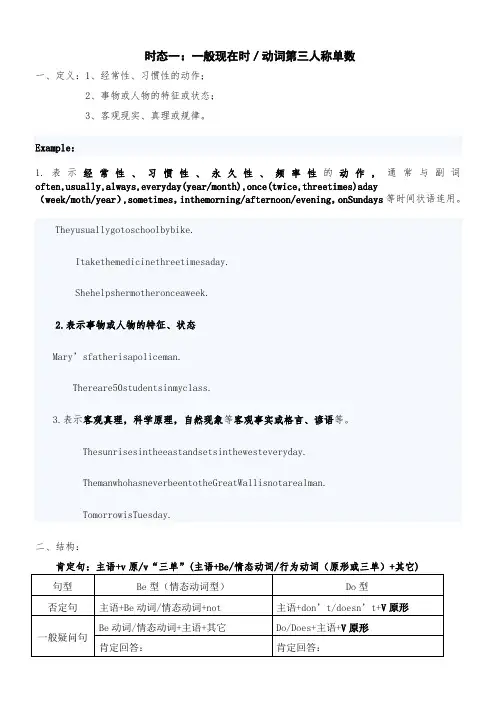
时态一:一般现在时/动词第三人称单数一、定义:1、经常性、习惯性的动作;2、事物或人物的特征或状态;3、客观现实、真理或规律。
Example:1.表示经常性、习惯性、永久性、频率性的动作,通常与副词often,usually,always,everyday(year/month),once(twice,threetimes)aday二、结构:肯定句:主语+v原/v“三单”(主语+Be/情态动词/行为动词(原形或三单)+其它)否定句:主语+Be/情态动词/do/dose+not+其它一般疑问句:Be/情态动词/do/dose+主语+其它特殊疑问句:特殊疑问词+Be动词/情态动词/do/dose+主语+其它(对主语提问除外)对主语提问的特殊疑问句=特殊疑问词+主语+动词原形/三单(肯定句的结构)+?Thisbookisyours.这本书是你的。
Thatcarisred.那辆小汽车是红色的。
ThecatisLucy's.这只猫是露茜的。
4、不定代词someone,somebody,nobody,everything,something等及指示代词this,that作主语时,是第三人称单数。
如:Everyoneishere.大家到齐了。
Thereissomethingwrongwiththewatch.这块手表有毛病。
Thisisapen.这是一支钢笔。
Thatisaneraser.那是一块橡皮擦。
5、不可数名词作主语时为第三人称单数。
如:Themilkisintheglass.牛奶在玻璃杯里。
Thebreadisverysmall.那面包很小。
6、当数字或字母作主语时,看作第三人称单数。
如:"6"isaluckynumber."6"是个吉利数字。
练习一:一般现在时/三单的练习题(一).用动词的适当形式填空1.She_________(go)toschoolatseveno’clock.改为一般疑问句:5.IwatchTVeveryday.改为一般疑问句:6.Davidhasgotagoal.改为一般疑问句:7.Wehavefourlessons.否定句:8.Nancydoesn’trunfast肯定句:9.Mydogrunsfast.否定句:一般疑问句:10. Mikehastwolettersforhim.一般疑问句:否定句:11. Iusually(playfootball)onFridayafternoon.否定句:一般疑问句:☆通过下列练习,你能否找到一些可用的规律?肯定句1.We_____(play)footballeveryday.2.Jim_____(want)anorange.3.Mymother______(watch)TVintheevening.4.She______(know)alittle(一点儿)English.5.Myfatheralways________(come)backfromworkverylate.6.Theteacherisbusy.He________(sleep)sixhoursaday.7.Thegirl_______(like)wearingaskirt.8.We_____(go)toschoolat7:30inthemorning.9._______Mike_______(read)Englisheveryday?10._______she_______(do)thehouseworkeveryday?11._______she_______(like)playingtheviolin?Yes,she_______(do).12._______they_______(like)theWorldCup?特殊疑问句1.Whatcolor_______yoursister_______(like)?2.Where_______you_______(have)luncheveryday?3.Whattime_______hisfather_______(do)thework?4.What_______(do)heusually_______(do)afterschool?5.Howmanylessons_______yourclassmates_______(have)onMonday?12.—_________________________________________________________________4.Amyli kesplayingcomputergames.(改为一般疑问句,并作否定回答)_________________________________________________________________5.Wegot oschooleverymorning.(改为否定句)_________________________________________________________________6.HespeaksEnglishverywell.(改为否定句)_________________________________________________________________7.Ilike takingphotosinthepark.(对划线部分提问)_________________________________________________________________8.Johnc omesfromCanada.(对划线部分提问)chTVeveryday.(改为一般疑问句)_________________________________________________________________16.Davi dhasgotagoal.(改为一般疑问句)_________________________________________________________________17.Weha vefourlessons.(改为否定句)__________________________________________ 18.Nancydoesn'trunfast.(改为肯定句)__________________________________________ 19.DanielwatchesTVeveryevening.(改为否定句)__________________________________________否定回答:对划线部分提问(特殊疑问句):3.Theyareonthechair.否定句:一般疑问句:肯定回答:否定回答:对划线部分提问(特殊疑问句):4.Thereisabirdinthesky.否定句:一般疑问句:肯定回答:否定句否定句7.Lilyhasablackball.否定句:一般疑问句:肯定回答:否定回答:对划线部分提问(特殊疑问句):8.Myfriendslikesapples.否定句:一般疑问句:肯定回答:否定回答:对划线部分提问(特殊疑问句):。
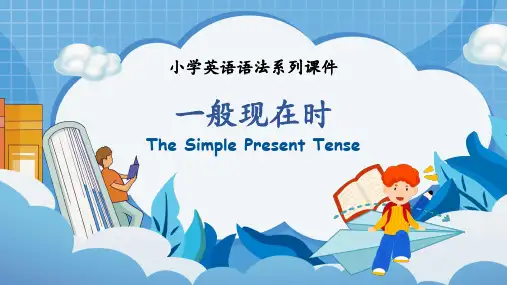
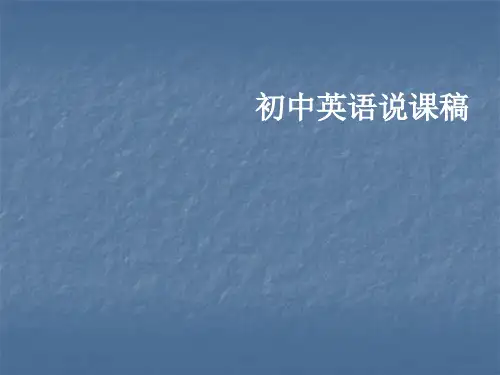
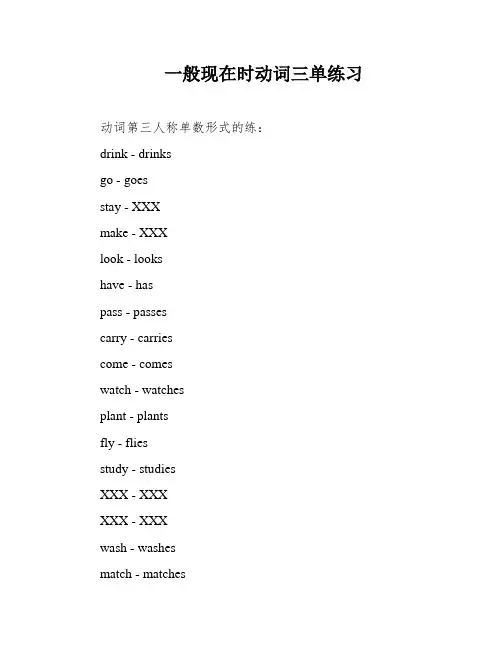
一般现在时动词三单练习动词第三人称单数形式的练:drink - drinksgo - goesstay - XXXmake - XXXlook - lookshave - haspass - passescarry - carriescome - comeswatch - watchesplant - plantsfly - fliesstudy - studiesXXX - XXXXXX - XXXwash - washesmatch - matchesguess - guessesfinish - finishes二.用括号内动词的适当形式填空。
1.He often has dinner at home.2.We do not watch TV on Monday.3.Nick does not go to the zoo on Sunday.4.Do they like the World Cup?5.What do they often do on Saturdays?6.Do your parents read newspapers every day?7.XXX.8.She and I take a walk XXX.9.There is some water in the bottle.10.XXX XXX cooking.11.They have the same hobby.12.XXX.13.You always do your homework well.14.I am XXX I'm staying in bed.15.XXX.16.Liu Tao does not like PE.17.The child often watches TV in the evening.18.Su Hai and Su Yang have eight lessons this term.19.I like swimming.20.He reads English every day.21.We go to school at seven in the morning.22.Mike goes to school at seven in the morning.23.XXX to go shopping.24.I can draw many beautiful pictures.25.She makes a model plane.26.Do you like to run?27.Does he like to jump?28.Does XXX Saturday?29.XXX XXX dance.30.XXX dance.31.The students speak English in class.32.The student speaks Chinese after class.33.Let's go and play football.XXX swimming.35.I'm XXX.36.Do you study English at school。

一般现在时讲解+动词三单+练习(总4页)-CAL-FENGHAI.-(YICAI)-Company One1-CAL-本页仅作为文档封面,使用请直接删除一般现在时讲解 + 动词三单 + 练习题定义:①表示现在的状态,如:Tom is a student..②表示经常发生或习惯性的动作或状态,如:We often play basketball together. 我们时常一块打球。
③表示主语现在的性格、特征、能力,如:Lucy can speak French.结构:I.当谓语动词是be时谓语动词be包括am,is ,are. 其用法是:我( I )用am;你( you )用are; is用于他( him )她( her )它( it );复数人称都用are.-主要句式:1.肯定句式主语+be(am,are,is)+其他。
She is a pretty.2.否定句式主语+be(am,are,is)+not+其他。
She isn’t pretty.3.一般疑问句将提前be(am,are,is) ,即:Be(am,are,is)+主语+其他? Is she pretty?肯定回答Yes,主语(必须是代词)+be(am,are,is)Yes, she is.否定回答 No,主语(必须是代词)+be(am,are,is )+not(必须用缩写形式 isn't/aren't)No, she isn’t.练习1.用be的适当形式填空1.---How____ you ---I____ fine.2.I___ David,and my family name___ Green.3.---What color ___ your clock ---It___ white.4.---What___ this in English---It___ an apple.5.Toy___my brother.David____my brother,too.They ___ my brothers.6.Look! These____apple trees.7.We____ good students and you____ good teacher.8.My sister and my brother_____ students.9.Five and three ____ eight.10.____your card number 5578?11.Where_____ your pencils?12.These sweaters ______ fifty dollars.13.How much ____ his jacket?14.My brother’s birthday____ December 11th.15.When _____ Kate’s birthday?2..将下面的句子变成一般疑问句并作出回答1.That is my football.2. Those are his books.3. Jim and Tom are good friends.4. My birthday is November 1st.5. His son is twelve years old.3. 将下面的句子变成否定句1. His card is on the table.2. There is some water in the bottle.3. Bob and Tony are our friends.4. There are thirty-five students in the classroom.5. The girl is his sister.II.当谓语动词是实义动词时1.当主语是第一人称(____\ ___);第二人称(____)及复数时主要句式:(1)肯定句主语+实义动词+其他 We livein Shanghai.(2)否定句主语+don’t+实义动词+其他(3)一般疑问句 Do+主语+实义动词+其他肯定回答:Yes,主语(必须是人称代词)+do.否定回答:No,主语(必须是人称代词)+don’t.2.当主语是第三人称单数he, she, it及单数的名词时,主要句式:(1)肯定句:主语+实义动词的第三人称单数形式+其他 Helive s in Shanghai.(2)否定句:主语+doesn’t+实义动词的原形+其他(3)一般疑问句 Does+主语+实义动词的原形+其他肯定回答:Yes,主语(必须是人称代词)+does否定回答:No,主语(必须是人称代词)+doesn’t变化规则:动词第三人称单数形式特殊变化 have----has1.一般情况加s,“S”在清辅音后发音为[s],在浊辅音及元音后发音为[z]。
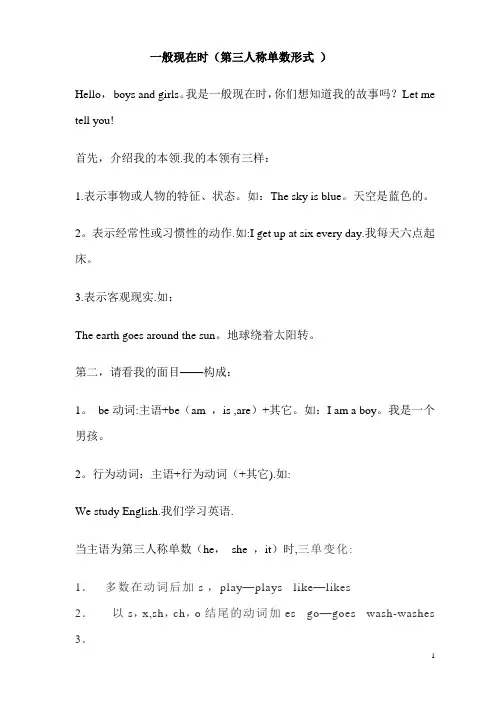
一般现在时(第三人称单数形式)Hello,boys and girls。
我是一般现在时,你们想知道我的故事吗?Let me tell you!首先,介绍我的本领.我的本领有三样:1.表示事物或人物的特征、状态。
如:The sky is blue。
天空是蓝色的。
2。
表示经常性或习惯性的动作.如:I get up at six every day.我每天六点起床。
3.表示客观现实.如:The earth goes around the sun。
地球绕着太阳转。
第二,请看我的面目——构成:1。
be动词:主语+be(am ,is ,are)+其它。
如:I am a boy。
我是一个男孩。
2。
行为动词:主语+行为动词(+其它).如:We study English.我们学习英语.当主语为第三人称单数(he,she ,it)时,三单变化:1.多数在动词后加s ,play—plays like—likes2.以s,x,sh,ch,o结尾的动词加es go—goes wash-washes 3.4.以辅音字母加y结尾,把y改i再加es,fly—flies 。
元音字母加y结尾的,直接加s,play—plays.5.特殊:have—has第三,我的变化——否定句、一般疑问句、特殊疑问句:1.be动词的变化。
否定句:主语+ be + not +其它。
如:He is not a worker。
他不是工人。
一般疑问句:Be +主语+其它。
如:-Are you a student?—Yes。
I am。
/ No, I'm not。
特殊疑问句:疑问词+一般疑问句.如:Where is my bike?2.行为动词的变化。
否定句:主语+ don’t(doesn’t ) +动词原形(+其它)。
如:I don't like bread。
当主语为第三人称单数时,要用doesn't构成否定句.如:He doesn't often play.一般疑问句:Do(Does ) +主语+动词原形+其它。
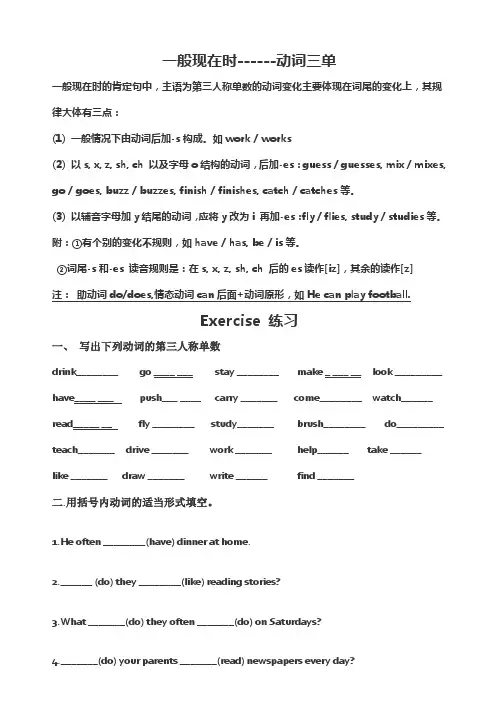
一般现在时------动词三单一般现在时的肯定句中,主语为第三人称单数的动词变化主要体现在词尾的变化上,其规律大体有三点:(1) 一般情况下由动词后加-s构成。
如work / works(2) 以s, x, z, sh, ch 以及字母o结构的动词,后加-es:guess / guesses, mix / mixes, go / goes, buzz / buzzes, finish / finishes, catch / catches等。
(3) 以辅音字母加y结尾的动词,应将y改为i 再加-es:fly / flies, study / studies等。
附:①有个别的变化不规则,如have / has, be / is等。
②词尾-s和-es 读音规则是:在s, x, z, sh, ch 后的es读作[iz],其余的读作[z]Exercise 练习一、写出下列动词的第三人称单数drink________ go ____ ___ stay ________ make _ ___ __ look _________ have____ ___ push___ ____ carry _______ come________ watch______ read_____ __ fly ________ study_______ brush________ do_________ teach_______ drive _______ work _______ help______ take ______like _______ draw _______ write ______ find _______二.用括号内动词的适当形式填空。
1.He often ________(have) dinner at home.2.______ (do) they ________(like) reading stories?3.What _______(do) they often _______(do) on Saturdays?4._______(do) your parents _______(read) newspapers every day?5.The girl _______(teach) us English on Sundays.6.She and I ________(take) a walk together every evening.7.Mike _______(like) cooking.8.They _______(have) the same hobby.9.He can_______(do) his homework well.10.My father is a factory worker. He ______(make) toy cars.11.She _______(go) to school from Monday to Friday.12.The boy often _______(watch) TV in the evening.13.Su Hai and Su Yang _______(have) eight lessons this term.14.He _________(read) English every day.15.We _________(go)to school at seven in the morning.16.Mike________(go)to school at seven in the morning.17.My mother________(like) ______(go) shopping.18.I can ________(draw) many beautiful pictures.19.She_________(make) a model plane.20.Do you ________(like)_________(run)?。
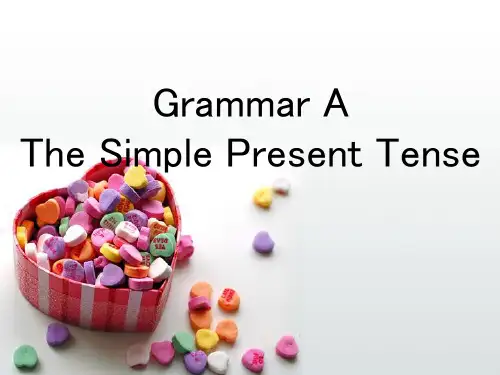
一般现在时1. 概念:经常、反复发生的动作或行为及现在的某种状况。
2. 时间状语:always,usually,ofte n,sometimes,every week(day,year,m on th ,),o nee a week, on Sun days,3. 基本结构:动词原形/第三人称单数形式(如主语为第三人称单数,动词上要改为第三人称单数形式)4. 否定形式:am/is/are+not; 谓语动词若为动词,则在其前加don't,如主语为第三人称单数,则用does n't,同时还原行为动词。
一般疑问句:把be动词放于句首;用助动词do提问,如主语为第三人称单数,则用does,同时,还原行为动词。
三单动词的变化规则1. 一般情况下,直接加-s 女口:play—plays, want—wants,work—works,know—knows,help—helps,get—gets2 .以s. x. sh. ch. o 结尾,力卩-es 女口:guess— guesses fix—fixes,teach—teaches,brush—brushes, go—goes,do—does,watch —watches,catch— catches3.以“辅音字母+y”结尾,变y 为i,再加-es 女口:study—studies,carry—carries,fly—flies,worry —worries规则:在一般现在时中,当主语是第三人称单数时,谓语动词要用第三人称单数形式,即常在动词原形后加-s或-es。
1. 人称代词中he, she, it是第三人称单数。
例如:①He likes swimming very much. 他非常喜欢游泳。
②She eats healthy food every day. 她每天吃健康的食物③It looks like a cat. 它看起来像只猫。
一般现在时主语单三人称时的动词变化①在一般现在时中,当主语为第三人称单数时,动词要用“s”型即第三人称单数形式;②所谓动词“s”型的构成,与名词变复数相似,即:a 在动词尾直接加s;如:play—plays, want—wants, work—works, know—knows, help—helps,get—getsb 以字母s、ss、x、ch、sh或o结尾的动词加-es;如:guess—guesses, fix—fixes, teach—teaches, brush—brushes, go—goes,do—does,watch —watches,catch—catchesc以辅音字母+y结尾的动词,先变y为i,再加-es;如:study—studies,carry—carries,fly—flies,worry—worries第三人称单数练习一.请选出正确的答案:1. She like / likes to play football.2. He like / likes drinking milk.3. I like / likes to watch TV.4. We like / likes to play badminton.5. They like / likes to sing songs.6. She read / reads books every day.7. He play / plays computer games every day.8. It listen / listens to the radio every day.9. Linda draw / draws pictures every day.10. Jane and Linda play / plays football every day.二.请用动词的适当形式填空;1. Let him _____playbasketball.2. Everyone_____knowwhat he really like.3. Those girls____bemy sister.4. That girl_____callme every Sunday.5. How___doshe_____spellthe word6. He________ TV every evening. watch7. We always ________ to school on foot. go8. Tom, with his classmates, often ______ football after school. play9. Your shoes _______ under the bed. be10. ______ here and ______ by me. come, stand11. His uncle usually _________ to work by bus. go12. I always ______ up at six in the morning.get13. John ________ like his father. look三.请用have或has填空;1.I ________ a nice picture.2.He ________ a good friend.3.They _________ some kites.4.We ________ some flowers.5.She __________ a duck.6.My father __________ a new bike.7.Her mother _________ a vase.8.Our teacher _________ an English book.9.Our teachers _________ a basketball.10.Their parents __________ some story books.11.Nancy _______ many skirts.12.David ________ some jackets.13.My friends ________ a football.14.What do you ________15.What does Mike ________四.否定句:在动词前+doesn't或don't.1. She_____ _____doher homework every day.2. He_____ _____livein Shanghai.3. He_____ _____needa pair pf shoes.4. Danny_____ _____seethe apple tree5. She_____ _____comefrom America.6. The girl_____ _____lookout of the window and sees many birds in the sky. 五.Do还是Does我来选;1. Do/Does______ he watch TV at night Yes he does.2. Do/Does______ you go to school e veryday No, I don’t.3. Do/Does______ Jack and Peter like apples4. Do/Does______ Tina go swimming on Sunday5. Do/Does______they play football Yes, they ___do/does.6. Do/Does______ we have a good teacher Yes, we ____do/does.7. Do/Does_____ they jump rope No, they ___do not/does not.8. Do/Does_____your dog walk in the zoo9. Do/Does____ I have a big nose No, you _____do not/does not.10. Do/Does____ your cats eat fish Yes, they _____.do/does.11. Do/Does_____ their mothers go shopping No, they ____do not/does not.12. I ___do not/ does not speak Japanese. Do/Does _____you speak Japanese 六.请用动词的适当形式填空;desk_____havefour legsYes, it does.doher homework every dayYes, she does.livein JinanNo, he doesn't.needa pair of shoesNO, he doesn't.5. Does Danny_____seethe apple treecomefrom AmericaYes, she_____.girl_____lookout of the window and sees many birds in the sky No, she_____.8. Jenny runs home and_____siton the chair七、选择题:1. I _____ to school every day.A. goB. goesC. going2. He _____ teeth every morning.A. brushB. brushesC. brushing3. The birds_____ singing.A. likeB. likesC. like to4. What does Lily _____ doingA. likeB. likesC. to5. _____ you like eating applesA. DoB. DoesC. Doing6. _____ he swim every afternoonA. DoB. DoesC. Doing7. Tom likes _____ in the classroom.A. singingB. singC. to singing8. –Does Sally like swimming--No, she .A. doB. doesC. doesn’t9. Peter and Mary _____ milk every day.A. drinkB. drinkingC. drinks10. _____ they read English every dayA. DoesB. AreC. Do八、把下列句子变为否定句:1. She draws pictures every day.2. We like playing football.九、把下列句子变为一般疑问句,并做肯定回答;1. Linda swims every day.2. They like playing games.。